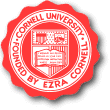
|
|||
| Grading | |||
| Grading Process and Late Policy | |||
If you believe your work has been graded incorrectly, submit a type-written description of the problem to the person who graded the assignment along with the annotated, graded material that we returned to you. You must submit your request within one week after we return your graded work.
The grader will consider your request and may regrade the entire submission from scratch. Your grade may go up or down.
If you are not satisfied with the grader's decision, add a written note explaining the disagreement and submit it to the instructor.
Do not submit a regrade request just because you think it is worth a trying for a higher score. If your regrade request does not have a credible basis, we may assume that you know even less about the assignment than the original grade indicates and lower it!
| Academic Integrity | |||
Academic Integrity. The work you submit in CS 519 is expected to be the result of your individual effort. You are free to discuss course material, approaches to problems, and details of the system with your colleagues, instructors, and consultants, but you should never misrepresent someone else's work as your own. Permissible cooperation should never involve a student possessing a copy of all or part of another student's program or other work regardless of whether that copy is on paper or in a computer file on a hard disk or a floppy disk. The only exception to these rules is when students work together to submit a joint project.
It is also the student's responsibility to protect his/her work from unauthorized access. For example, do not discard copies of your programs in public places.
Violation of the Academic Integrity Code very often results in failure in the course and permanent notations on your Cornell academic records. If you have any question as to what constitutes ethical behavior, ask the instructor first. We will not be sympathetic to claims of ignorance or misunderstanding of the rules.
Department Academic Integrity Policy: http://www.cs.cornell.edu/ugrad/AcadInteg.html
Cornell University: http://www.cornell.edu/Academic/AIC.html
Note: We may run a program that compares code and detects cosmetic changes. We also plan to photocopy a random number of exams after grading.
|
|

|